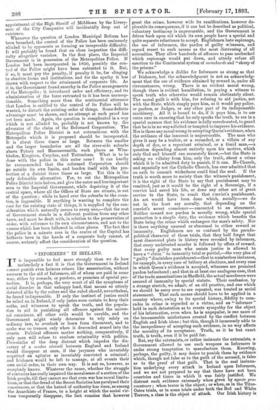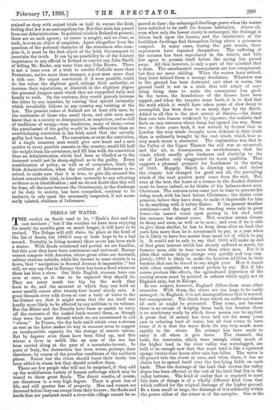" INFORMERS " IN IRELAND.
IT is impossible to feel more strongly than we do how melancholy a fact it is that the Government in Ireland cannot punish even heinous crimes like assassination, without recourse to the aid of Informers, all of whom are paid in some way, either by rewards, or pardons, or promises of special pro- tection. It is, perhaps, the very worst of all the symptoms of social disorder in that unhappy land, that means so utterly detested alike by the rulers and the ruled should, nevertheless, be found indispensable. If only the instinct of justice could be relied on in Ireland, if only juries were certain to keep their oaths, and witnesses to speak the truth, and the popula- tion to aid in punishing all offences against the univer- sal conscience, all other evils would be curable, and the Government might wisely determine to rely solely on ordinary law, to overlook or learn from discontent, and to make war on treason only when it descended armed into the streets. Political offences matter nothing, comparatively, if only men will refuse to confuse criminality with politics. Five-sixths of the deep distrust which impedes the dis- covery of a modus vivendi between England and Ireland would disappear at once, if the jurymen who invariably acquitted an agitator as invariably convicted a criminal ; and Irishmen would be left to manage, at all events their own social order, in their own way. It is not so, however, as everybody knows. Whatever the cause, whether the struggle of centuries has really impaired the moral sense of a section of the Irish people, till they cannot see that even war has moral limita- tions, or that the dread of the Secret Societies has paralysed their consciences, or that the hatred of authority has risen, as among the Anarchists of France, to a height at which the social vir- tues temporarily disappear, the fact remains that however
great the crime, however wide its ramifications, however de- plorable its consequences, if it can but be described as political, voluntary testimony is unprocurable, and the Government is driven back upon aid which its own people have a special and quite separate reluctance to accept. Englishmen hate espionage, the use of informers, the pardon of guilty wItnesses, and regard resort to such means as the most distressing of all necessities. They allow hundreds of offences to pass unchecked which espionage would put down, and utterly refuse all sanction to the Continental system of mouchards and "sheep of the prisons."
We acknowledge a dislike for Informers as strong as that of Irishmen, but the acknowledgment is not an acknowledg- ment that the use of evidence obtained by reward is, under all circumstances, wrong. There is no evident moral wrong, though there is evident humiliation, in paying a witness to speak truth who otherwise would remain obstinately silent. The moral guilt is with him, for refusing to aid justice, not with the State, which simply pays him, as it would pay police, or gaolers, or Judges, or any other part of its indispensable machinery. All it is bound to do, if it pays him, is to use extra care in ensuring that he only speaks the truth, to see in a special manner that his evidence is fully corroborated, to guard that he is in no way solicited or tempted to improve his evidence. Nor is there any moral wrong in accepting Queen's evidence, when the evidence of the innocent is unprocurable. The man who gives it may be a traitor, or a scoundrel, or a villain of any depth of dye, or a repentant criminal, or a timid man,—a question depending almost entirely upon his motive, which only God and himself can accurately know,—but the State is asking no villainy from him, only the truth, about a crime which it is its admitted duty to punish, if it can. No Church, and especially not the Catholic Church, has ever admitted that an oath to commit wickedness could bind the soul. If the truth is worth more to society than the witness's punishment, it is the right of the State to say that punishment may be remitted, just as it would be the right of a Sovereign, if a convict had saved his life, or done any other act of great service to the State, to remit that canvict's punishment. An act would have been done which, socially—we do not in the least say morally, that depending on the convict's secret conscience—amounted to an atonement. Neither reward nor pardon is morally wrong, while special protection is a simple duty, the evidence which benefits the State being the crime which endangers the man's safety. Nor is there anything unusual or abnormal in either reward or immunity. Englishmen are so confused by the pseudo- political character of these trials, that they half forget that most discovered plots in history were revealed by informers, that every undetected murder is followed by offers of reward, that every guilty man who assists justice is allowed to have a " claim" to immunity total or partial,—the very plea of " guilty "diminishes punishment—that in numberless instances, for example, in every case of bribery at elections, and every case in which Queen's evidence is accepted, witnesses are promised pardon beforehand ; and that in at least one analogous case, that of the trade assassinations in Sheffield, the actual murderers were assured of immunity by special statute. Their confession, by a strange stretch, we admit, of an old practice, and one which we should be sorry ever to see repeated, was treated as social atonement. That such means should have to be applied in a country where, owing to its special history, fidelity to com- rades in crime is regarded as a virtue, and an " informer " held in such detestation as to create sympathy for the object of his information, even when he is unpopular, is one more of the innumerable misfortunes created by the conflict between English and Irish ideas ; but this, though it immensely adds to the inexpediency of accepting such evidence, in no way affects the morality of its acceptance. Truth, so it be but exact truth, is truth, even if it be paid for.
But, say the extremists, or rather insinuate the extremists, a Government allowed to use such weapons as Informers is under strong temptation to manufacture them. Knowing, perhaps, the guilty, it may desire to punish them by evidence which, though not false as to the guilt of the accused, is false as to the proof of that guilt. That is the real insinua- tion underlying every attack in Ireland upon Informers, and we are not prepared to say that there have not been countries and times in which it was fairly justified. We distrust such evidence extremely when given by agents pro- vocateurs; when terror is the object ; or when, as in the Titus- Oates trials, or in some trials under both the Red and White Terrors, a class is the object of attack. Oar Irish history is
stained so deep with unjust trials as half to excuse the Irish feeling that law is an unscrupulous foe. But that stain has passed from our Administration. In political trials in Ireland at present, there are no such agents ; no terror is sought, and no class, as such, is even an object of suspicion. Apart altogether from the question of the personal character of the statesmen who com- pose it, it must be the first object of the Irish Government to ascertain the truth. It can by no possibility be of the faintest importance to any official in Ireland to convict any John Smith of killing Mr. Burke, any more than any John Brown. There is not a trace even of a wish to convict Catholic more than Protestant, native more than stranger, a poor man more than a rich one. No unjust conviction, if it were possible, could do the rulers the slightest good, enlarge their authority, or increase their reputations, or diminish in the slightest degree the personal dangers amid which they are compelled daily and hourly to walk. On the contrary, they would gravely increase the latter by any injustice, by rousing that special animosity which invariably follows in any country any twisting of the law. The present rulers of Ireland are at least able men, by the confession of those who assail them, and able men must know that in a society so disorganised, so suspicious, and so full of traditions of wrong—true traditions, many of them—even the punishment of the guilty would be less efficacious than an overwhelming conviction in the Irish mind that the actually guilty had been found. The execution, or even the conviction, of a single innocent man would give new heart and a new motive to every possible assassin in the country, would lift half the weight from his conscience, and fill him with the conviction than an Administration which had been so blinded as to the innocent would not be sharp-sighted as to the guilty. Every consideration of policy, as well as of conscience, binds the Irish Administration, when the evidence of Informers is re- ceived, to make sure that it is true, to give the accused the fairest conceivable trial, to hearken earnestly to any rebutting evidence as to identification ; and we do not doubt that this will be dope, all the more because the Government, in the discharge of its duty to society, has been compelled, contrary to its instincts, to rely upon the necessarily suspected, if not neces- sarily tainted, evidence of Informers.















































 Previous page
Previous page